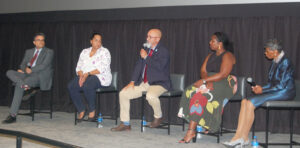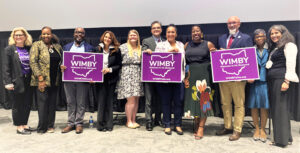
By Tricia Hall
The Truth Reporter
Zip Code Matters, a documentary that explains how an individual’s zip code impacts several factors including health, held an in-person premier on September 8th at Imagination Station’s Theatre. Immediately following the premier, a community dialogue was held to converse about the documentary themes.
Zip Code Matters, opens with the actual definition of a Zip Code, ‘which is a number that identifies a particular postal delivery area in the United States’. Throughout the documentary, several issues are discussed by subject matter experts and supported by visual facts.
“In this country a lot of our schools are funded by property taxes. Neighborhood zip codes that have higher income and more expensive homes generate more property tax. Meaning the schools have access to a larger amount of money. Whereas a low to moderate income neighborhood, the homes aren’t as expensive and don’t generate as much in property taxes so those schools are under resourced. If a child comes from a school that lacked resources, they are starting life already behind,” Marie Flannery from The Fair Housing Center said in the documentary.

“What we know is place matters, your physical place matters and resources matter. We need to think hard about how we’re addressing wellbeing, and how we’re making investments in things like high-quality pre-school and a healthy housing stock,” Kate Sommerfeld from Promedica added.
“If we know that people have dreams about going to college or trade schools, but they can’t get to them, that’s a barrier. We know that folks want to work in certain industries, but there’s no public transit to get there from their zip code or their community. We’re creating barriers,” Kendra Smith from Bon Secours Mercy Health also noted.
200 local individuals and leaders attended the premier and discussion. Patty Wise, chair of The Fair Housing Center Board and Sena Mourad Friedman, Fair Housing Center vice president Operations and Development, explained the documentary background and reception thus far. A representative from Sherrod Brown’s office, who also appears in the documentary, presented Mourad Friedman with a certificate of recognition for writing and directing the documentary.
“This was done 100 percent in Toledo. We received 241 film festival invitations, completed 61 submissions, were selected by 21 festivals and received 12 awards so far,” explained Wise.
“We want to explore how to heal and erase redlining, which is the reason for the documentary. I’m feeling so humbled and honored, as tonight is the icing on the cake. This documentary has started conversations in schools and communities across the country and distributed by the National Association of Realtors to their membership,” shared Mourad Friedman.
The panel dialogue was facilitated by Rhonda Sewell, Toledo Museum of Art Director of Belonging and Community Engagement. The panelists were: Joaquin Cintron Vega, LMH president and CEO; Kendra Smith, Bon Secours Mercy Health vice president of Community Health; George Thomas, The Fair Housing Center vice president and general counsel; Juanita Greene, activist and community leader, and Adrienne Bradley, Promedica director of Community Impact.
“Such a powerful film. I’ve watched this several times but tonight was different. Thank you Sena for showcasing Toledo on the national stage,” said Rhonda Sewell.
“When it comes to true engagement, you have to listen and be prepared to do something about it,” added Kendra Smith.
“It’s important to build relationships and listen to the needs of the community. If the community doesn’t feel supported, I urge the citizens of Toledo to ask questions and vote for representatives who understand your needs. Understand that the people have the power,” said Juanita Greene.
The documentary has won an award from each of these film festivals: DocuWest Documentary Film Festival, City of Angels Women’s Film Festival, LAFA, Vegas Movie Awards, Disruptor Film Awards, Better Cities Film Awards and Love Wins International Film Festival.
The film is a project from The Fair Housing Center in Toledo, produced by Creadio, written and directed by Sena Mourad Friedman. The executive producer was Will Lucas, the producer was Erickson Blakney and the film was edited by Andre Lewis and Robby Brumfield.
